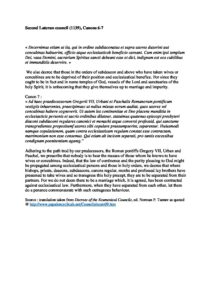« Decernimus etiam ut iia, qui in ordine subdiaconatus et supra uxores duxerint aut concubinas habuerint, officio atque ecclesiasticob beneficio careant. Cum enim ipsi templum Dei, vasa Domini, sacrarium Spiritus sancti debeant esse et dici, indignum est eos cubilibus et immunditiis deservire. »
We also decree that those in the orders of subdeacon and above who have taken wives or concubines are to be deprived of their position and ecclesiastical benefice. For since they ought to be in fact and in name temples of God, vessels of the Lord and sanctuaries of the holy Spirit, it is unbecoming that they give themselves up to marriage and impurity.
Canon 7 :
« Ad haec praedecessorum Gregorii VII, Urbani et Paschalis Romanorum pontificum vestigiis inhaerentes, praecipimusc ut nullus missas eorum audiat, quos uxores vel concubinas habere cognoverit. Ut autem lex continentiae et Deo placens munditia in ecclesiasticis personis et sacris ordinibus dilateur, statuimus quatenus episcopi presbyteri diaconi subdiaconi regulares canonici et monachi atque conversi professid, qui sanctume transgredientes propositumf uxores sibi copulare praesumpserint, separentur. Huiusmodi namque copulationem, quam contra ecclesiasticam regulam constat esse contractam, matrimonium non esse consemus. Qui etiam ab incicem separati, pro tantis excessibus condignam poenitentiam agantg.”
Adhering to the path trod by our predecessors, the Roman pontiffs Gregory VII, Urban and Paschal, we prescribe that nobody is to hear the masses of those whom he knows to have wives or concubines. Indeed, that the law of continence and the purity pleasing to God might be propagated among ecclesiastical persons and those in holy orders, we decree that where bishops, priests, deacons, subdeacons, canons regular, monks and professed lay brothers have presumed to take wives and so transgress this holy precept, they are to be separated from their partners. For we do not deem there to be a marriage which, it is agreed, has been contracted against ecclesiastical law. Furthermore, when they have separated from each other, let them do a penance commensurate with such outrageous behaviour.
